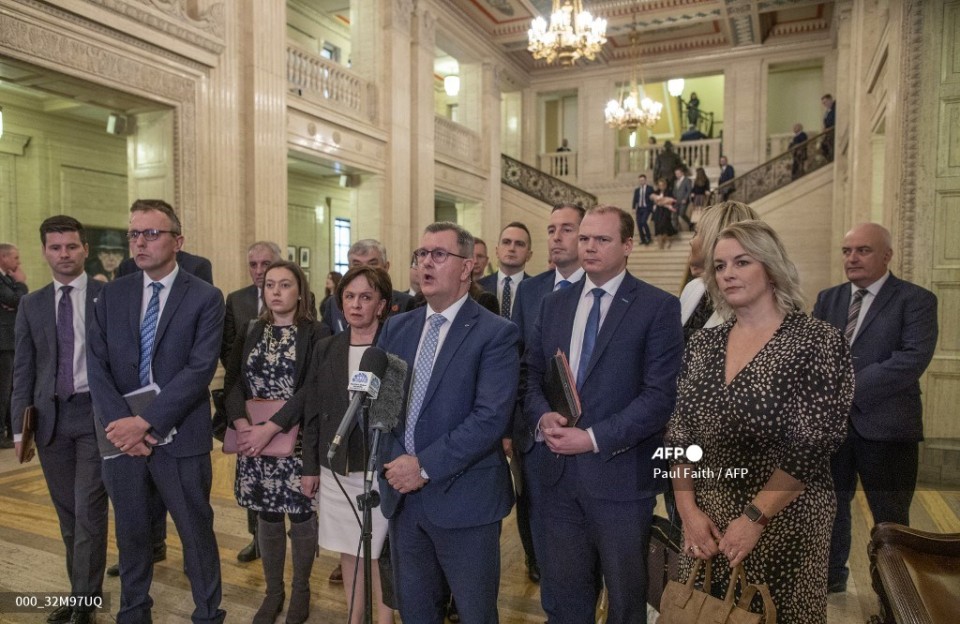
Belfast, United Kingdom | AFP |
by Callum Paton in Belfast and Helen Rowe in London
Northern Ireland on Thursday appeared headed for a second election this year after the leader of the pro-UK Democratic Unionist Party said his grouping had not changed its position on contentious post-Brexit trade rules.
DUP leader Jeffrey Donaldson told reporters insufficient action had been taken to address their concerns on the so-called Northern Ireland Protocol governing post Brexit trade.
The party would therefore not be supporting the nomination of ministers to the executive, he said, speaking before a special sitting of the Northern Ireland assembly at Stormont.
“We need to remove the rubble of the protocol that has undermined our economy, that has inhibited our ability to trade within our own country and changed our constitutional status without our consent, a protocol that every day is harming businesses and driving up the cost of living for every single person in Northern Ireland,” he said.
New British Prime Minister Rishi Sunak’s message to the parties was to “get back to Stormont… because the people of Northern Ireland deserve a fully functioning and locally elected executive”, his official spokesman said.
– ‘Time is running out’ –
UK government efforts to resolve months of political stalemate have failed to secure a breakthrough in recent days.
Chris Heaton-Harris, Britain’s Northern Ireland minister, held talks with the political parties on Wednesday in a fresh bid to get them to form a new executive.
If no agreement is reached by Friday, London will be legally required to call early elections for the devolved assembly in the volatile province.
“If the executive is not formed by 28 October, I will call an election,” the minister said in a statement earlier. “Time is running out.”
Northern Ireland has been without a functioning government since February, when DUP collapsed the executive over its staunch opposition to post-Brexit trade rules there.
It wants the protocol — agreed by London and Brussels as part of Britain’s 2019 Brexit deal — overhauled or scrapped entirely. They say it weakens the province’s place within the United Kingdom.
Many unionists also argue the pact is threatening the delicate balance of peace between the pro-Irish nationalist community and those in favour of continued union with Britain.
The Brexit measures — which effectively keep Northern Ireland in the European Union’s single market and customs union — were agreed to avoid the return of a hard land border with the neighbouring Republic of Ireland, which remains an EU member.
Eliminating that hard border was a key strand of the 1998 Good Friday Agreement, which ended three decades of sectarian violence in Northern Ireland.
– ‘Perpetual standoff’ –
Pro-Irish party Sinn Fein scored a historic first electoral victory in May, further complicating efforts to restore power sharing.
Sinn Fein leader Michelle O’Neill on Thursday condemned the DUP’s “perpetual standoff with the public, the majority of whom they do not speak for or indeed represent”.
O’Neill is set to become Northern Ireland’s first minister if the executive can be restarted.
Britain’s Conservative government, which has been wracked by turmoil and had three prime ministers in two months, has urged Brussels to revise the protocol and is passing contentious legislation to rip it up.
Britain has previously threated to unilaterally modify it.
That has sparked fears of a trade war and worsening relations with Europe, when the economic landscape is already gloomy.
The impasse was discussed in a phone call on Wednesday between Sunak and Irish premier Micheal Martin.
Sunak also spoke by phone to European Commission President Ursula von der Leyen, who said on Twitter that she hopes to find “joint solutions under the protocol… that will provide stability and predictability”
© Agence France-Presse








